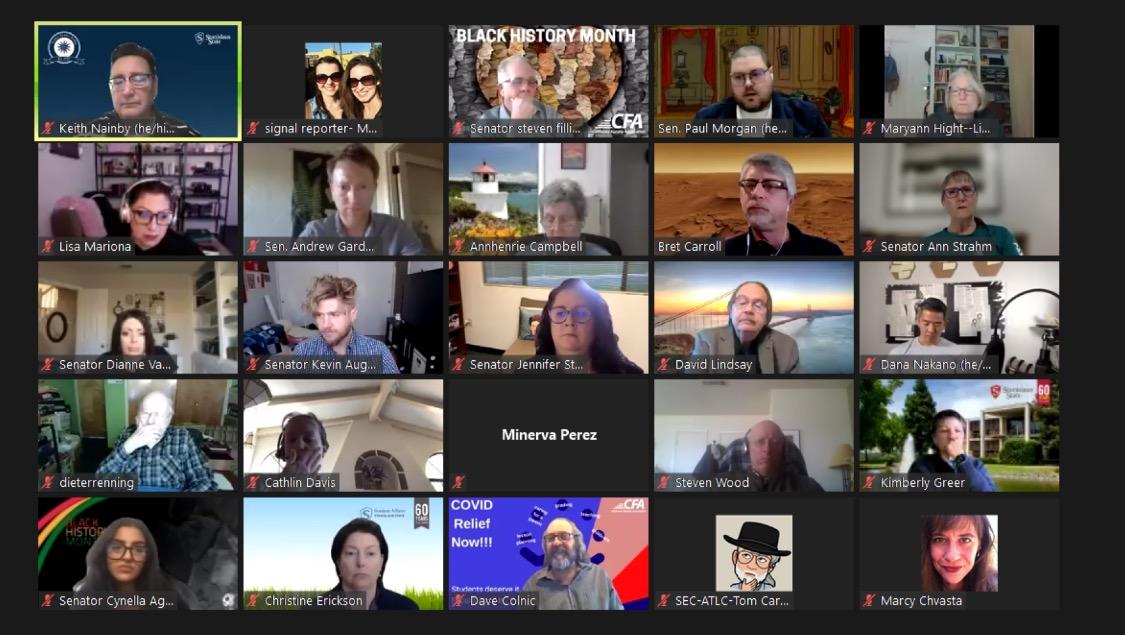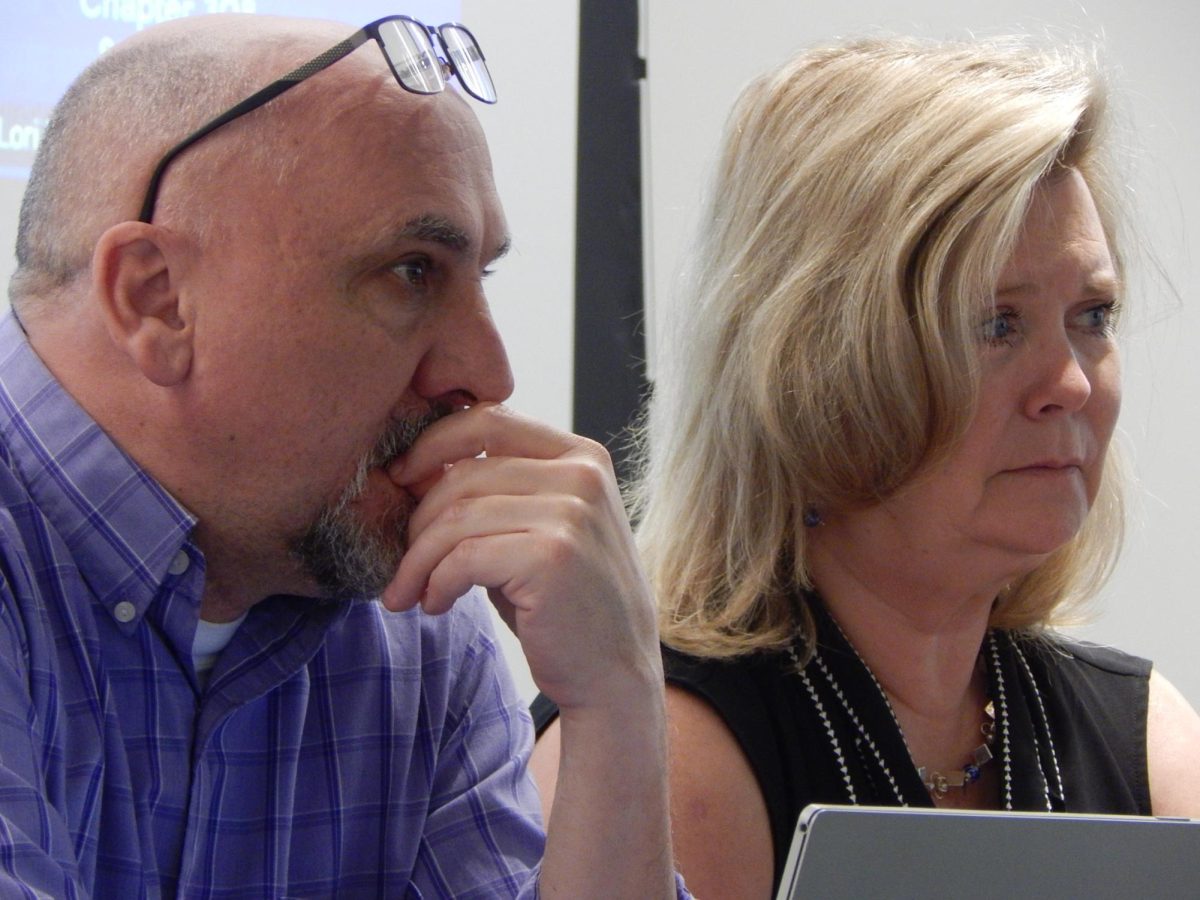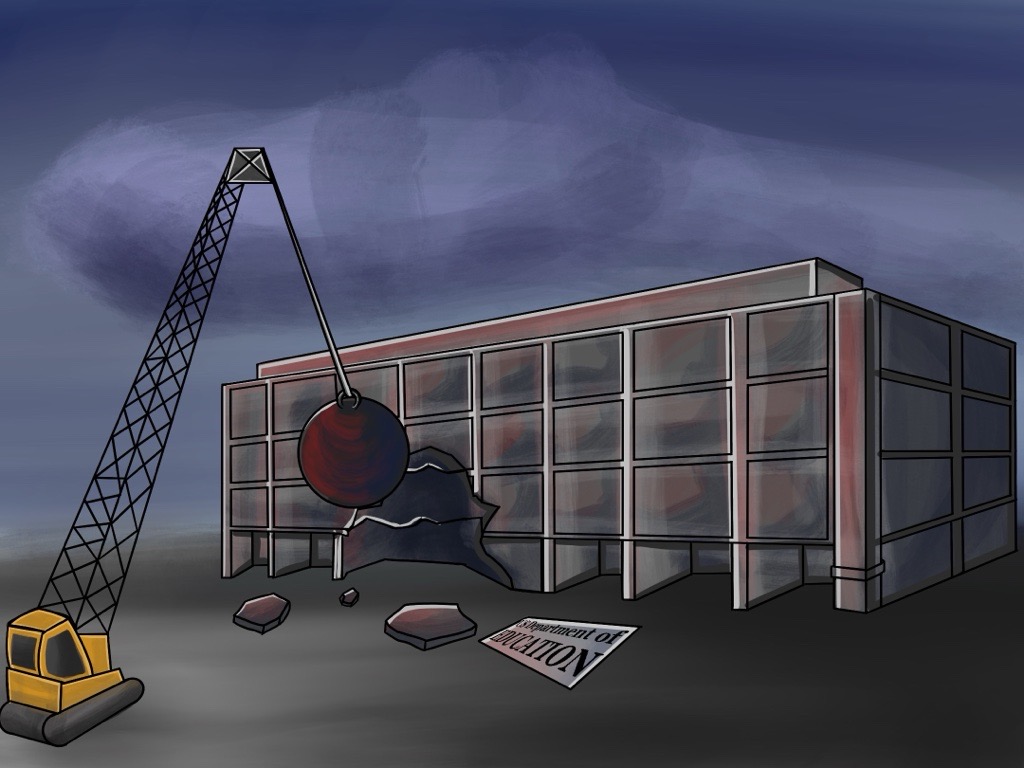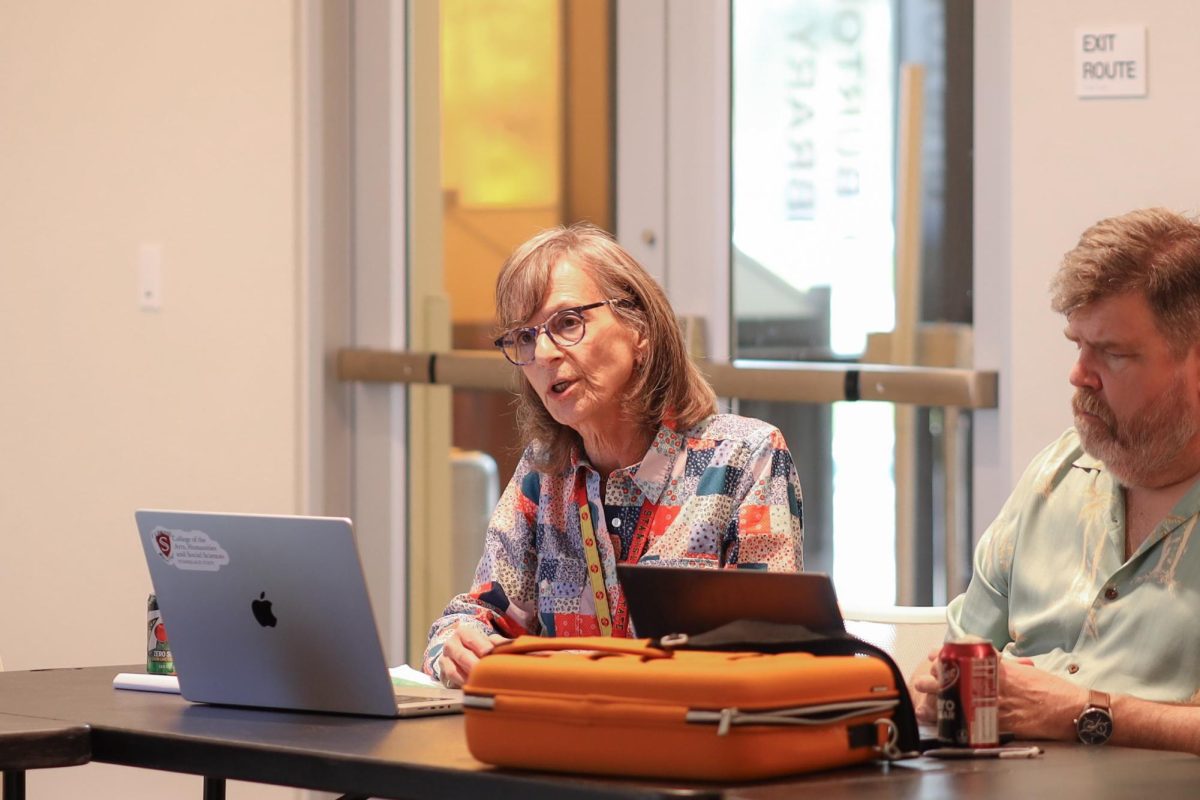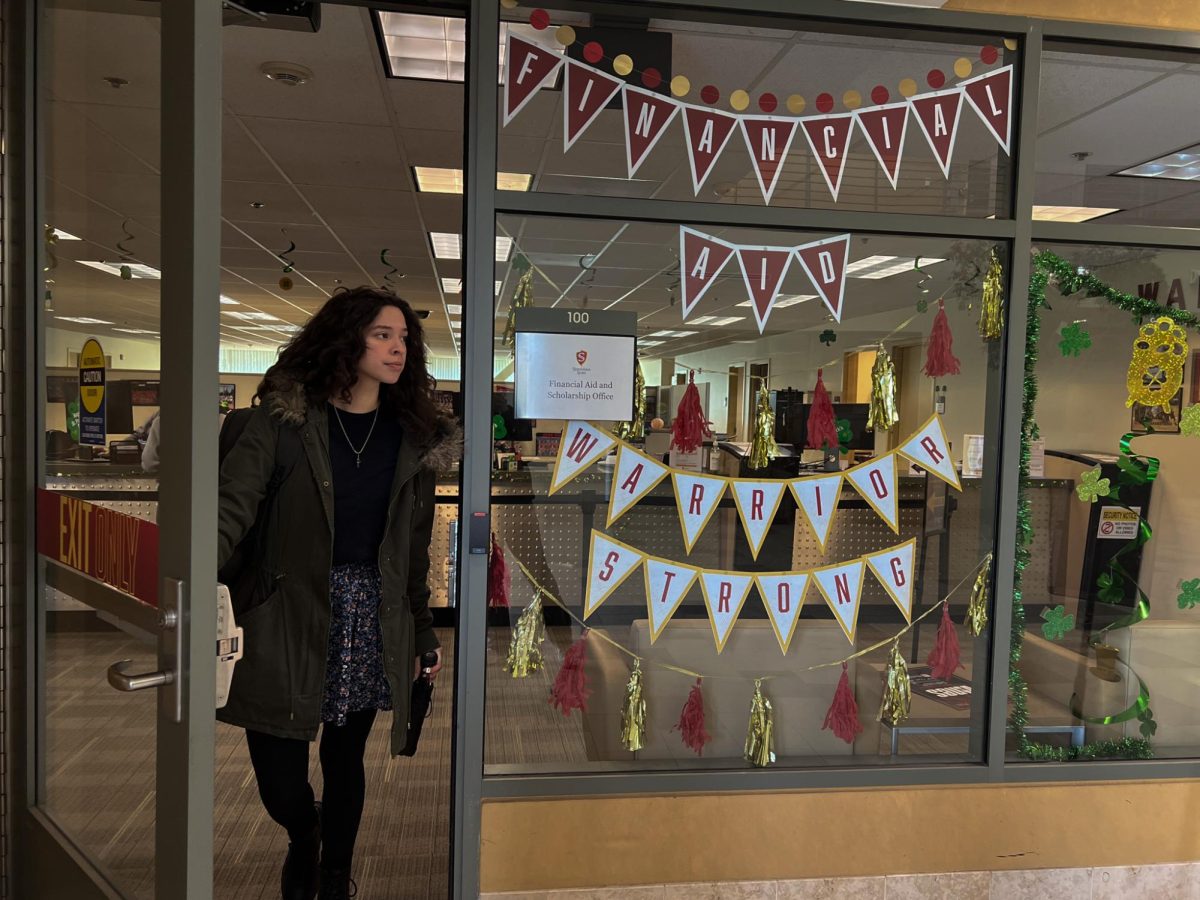On Tuesday, February 23, Stan State’s Academic Senate held its third meeting of the spring 2021 semester. During the meeting, senators continued discussion regarding on-campus academic spaces for the fall 2021 semester, updates on the preferred name use policy, the introduction of a Computer Science concentration for Liberal Studies majors, changes to general education requirements, and event announcements.
Academic Spaces in the Fall Semester
Continuing conversation from the last Academic Senate meeting, Provost Kimberly Greer maintained that, while tentative plans are being made to bring some students and faculty back to campus in the fall, classroom capacities largely depend on the county’s Covid cases.
Greer claimed that Stan’s administration is working on evaluating “non-instructional” spaces to use as classrooms. Additionally, they are discussing ways to allocate office spaces for faculty and spaces for students to use in between classes.
In light of limited spaces, Cathlin Davis, Chair of the University Education Policy Committee (UEPC), encouraged faculty members with assigned spaces on campus to share their space with other faculty, staff and students while they are not personally on campus.
Statewide Senator Ann Strahm agreed, saying “I do think we have a caste system on campus where we treat some faculty members as lesser.” Such a caste system means that some faculty members with business on campus may not be assigned the necessary space to work. To combat this, Strahm suggested that department chairs insist their faculty members share their assigned spaces when possible.
Senator Michelle Soto-Peña brought up another concern for the campus’s potential fall re-opening. She highlighted inconsistencies across CSUs in re-opening childcare centers and asked if there were plans to open Stan’s Childcare Development Center this fall.
Provost Kimberly Greer asserted that there have been propositions to re-open the Childcare Development Center, but the implementation will, like all academic spaces, depend on the county’s Covid case numbers.
Preferred Name Use Policy
The meeting also covered a second discussion concerning Stan State’s preferred name use policy. Since the Senate’s last session, some changes were made to the policy.
Davis explained that there is now a plan to assess the policy and its related procedures by the year 2023. She claimed this assessment is included to ensure the policy is meeting students’ needs and is functioning appropriately for faculty.
However, two primary concerns were brought up during this meeting which led to a 32-5 vote (3 abstaining) to send the policy back to the UEPC for review. The first concern was with the policy’s timeline.
Lecturer Faculty Representative Paul Morgan insisted, “the procedure [for timeline] is unclarified.” Since students are already capable of changing their first name on PeopleSoft, Morgan moved to wait until the next meeting to call the policy to vote due to the unclear implementation timeline.
Senator Bret Carroll agreed with the move to postpone voting, also bringing up the concern that name changes may not be flagged immediately, meaning faculty members may remain temporarily unaware that a name change occurred. Lacking a clear timeline, Carroll stated, “It (the preferred name use policy) begins to have a sense of arbitrariness.”
The second concern which led to calls for review concerned the policy’s mention of the Warrior Cross Cultural Center.
Early in the discussion, Davis stated that Stan State’s registrar would contact the Warrior Cross Cultural Center if there was concern over a student’s preferred name selection. According to Davis, Lisa Bernardo, Dean of Admissions, suggested the Warrior Cross Cultural Center be consulted due to the center’s capacity to address cultural considerations in name use. Multiple senators were concerned that the Warrior Cross Cultural Center was not aware of this assigned responsibility.
Christine Erickson, Vice President of Student Affairs, explained that “No one in Student Affairs or the Warrior Cross Cultural Center was contacted in regards to this policy.” The center would have to be contacted before the policy could pass.
Liberal Studies Computer Science Concentration
The Senate voted 39-0 (with 1 abstaining) to approve the new Computer Science concentration for the Liberal Studies major.
Davis, who is also the Chair of the Liberal Studies department, explained that in the Liberal Studies program, students must choose a concentration. In recent years, students have demonstrated interest in creating a Computer Science concentration. Currently, the concentration does not require Liberal Studies students to take any additional courses.
Senator Tom Carter, Chair of the Computer Science department, casted his support behind the concentration. “This has been a several year process to make sure there’s good coordination between the Computer Science and Liberal Studies departments.” Carter hopes that current teachers will take advantage of this new concentration along with prospective teachers.
The proposed concentration was supposed to go to vote during the next Academic Senate meeting on March 9, but Stuart Wooley, Associate Vice President of Academic Affairs, asserted that in order to have the concentration available on the catalog for the 2021-2022 academic year, it would need to be included by mid-April. In response, senators moved to vote early.
With the Academic Senate’s approval, the Computer Science concentration awaits approval by the Chancellor’s Office.
Policy on Human Subjects Research
Stan State’s University Institutional Review Board (UIRB) reviews research protocols for human subjects. With social distancing guidelines, many studies are being conducted in an online format. Investigators planning on conducting a study with human subjects must apply for review by the UIRB if the study necessitates direct interaction with the subjects or use of subjects’ private records.
Representing the UIRB, Steven Drouin described a new policy concerning research procedures and UIRB applications. Drouin claimed this new policy will require CITI training for those interested in applying for UIRB approval on their study.
CITI Training, or the Collaborative Institutional Training program, covers protection of human subjects, the care of animals in research, and ways to responsibly conduct research.
The Academic Senate voted 39-0 (with 2 abstaining) to pass the policy requiring CITI Training.
General Education Requirements
With updates to Title V, Stan State is in the process of reviewing and potentially changing general education requirements. One specified area of change concerns an Ethnic Studies requirement.
Speaker of the Faculty Keith Nainby mentioned an “ad hoc committee [focused] on finding ways to implement an Ethnic Studies requirement that met the statewide learning outcomes.”
The UEPC will be focusing on changes to the general education pattern while the ad hoc committee will focus on understanding which curriculum at Stan State meets the Ethnic Studies requirement.
Concerning updates to the university catalog, Davis insists that including changes to the Ethnic Studies requirement is of utmost importance.
At Stan State, students are required to take Writing Proficiency courses within their selected majors. Previously, students had to pass the Writing Proficiency Screening Test (WPST) in order to be approved for these courses. Recently, this test has been removed as a requirement, leaving faculty questioning how to prepare students for the Writing Proficiency courses.
Davis explained that the Writing Committee is brainstorming options such as portfolio workshops, but nothing is officially decided.
Online Teaching
With virtual instruction likely to remain at Stan and other universities for some time, the Statewide Academic Senate Committee is working on developing more protections for faculty on platforms such as Zoom. “Zoom bombs” continue to occur in which persons not enrolled in or instructing a course may enter a Zoom call and potentially harass others.
Even without Zoom bombers, instructors face other challenges while teaching virtually. Speaking for the Statewide Academic Senate Committee, Steven Filling claims they are “developing a statement on faculty burnout, a topic that is so timely.”
Announcements
In the chat, Senator Strahm brought the Senators’ attention to the student food pantry. On February 24 from 10:00 a.m. to 12:00 p.m., there will be a free food box distribution at Stan State. The first 75 boxes distributed will contain produce and eggs.
Senator Jennifer Staffero announced an upcoming event taking place on March 24 from 9:00 a.m. to 1:00 p.m. The event is called “Creating a Culturally Competent & Responsive Environment w/ Lee Mun Wah.” For more information on this workshop and for steps to sign up, click here.
The next Academic Senate meeting will be held on March 9.
Categories:
Discussions Continue Regarding Updated Education Requirements and Fall 2021 Semester at Latest Academic Senate Meeting
0
Donate to Signal
Your donation will support the student journalists of California State University, Stanislaus. Your contribution will allow us to purchase equipment and cover our annual website hosting costs.
More to Discover

